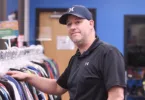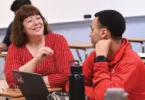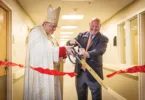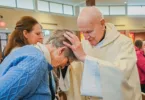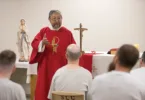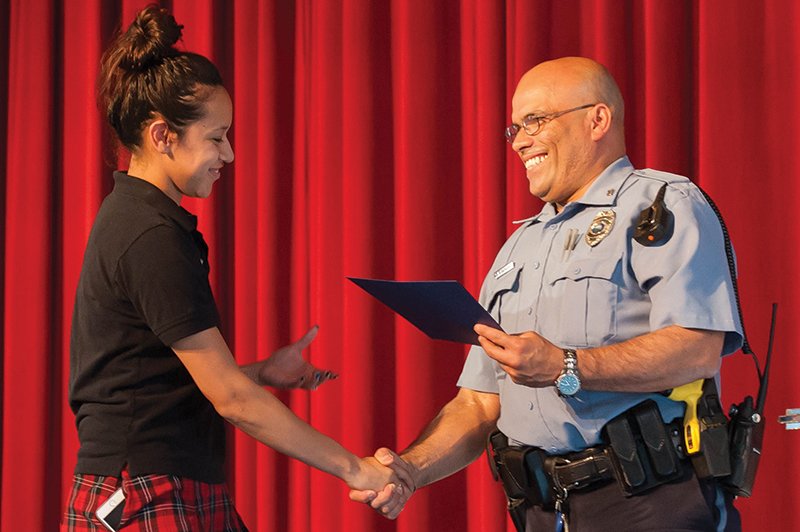
Officer Santiago Vasquez, Bishop Ward student resource officer and a senior master patrolman with the Kansas City, Kansas, Police Department congratulates senior Yusmayra Calderon on completing Ward’s Junior Police Academy program. Photo by Jessica Langdon.
by Jessica Langdon
jessica.langdon@theleaven.org
KANSAS CITY, Kan. — A handshake. A nickname. A laugh. Someone teenagers can talk to — and they do.
These descriptions don’t match many of the news stories that have gripped the United States in recent months detailing tensions between police and communities.
But they describe just a few of the interactions between students at Bishop Ward High School in Kansas City, Kansas, and Officer Santiago Vasquez, student resource officer and a senior master patrolman with the Kansas City, Kansas, Police Department.
Vasquez’s career in police work spans 23 years.
For the past seven, he’s spent his days at Ward, where he has now led three years of a program called the Junior Police Academy.
It’s part of a national program, and KCK Police Chief Terry Zeigler implemented it here several years ago. The department follows a deep-rooted community policing philosophy.
Junior Police Academy can lead young people to positions as police cadets.
But it also educates high school students about law enforcement and the law, teaches them about their constitutional rights, and strives to close the gap between youth and police officers, said Vasquez.
Bishop Ward’s program started with 11 students, then grew to 27 in its second year. This year, it topped 30.
“I feel like everybody’s eager to be here,” said Luis Adrian Villarreal, a senior. “It informs us. It prepares us for our future as adults in a society that’s maybe not the fairest.”
“I watch crime shows, so I was already interested,” said Teila Broxton, a junior, who was particularly interested in learning more about crime scene investigation. “I wanted to see the background of it, the different parts of it, what it actually takes to be a police officer.”
“I like crime shows,” agreed junior Daniela Tapia, “but what made me join was Officer Vasquez. I always look up to him, and I always see him do his duty. It made me want to come and join — see from his perspective.”
The students learned that police work can be difficult.
Vasquez encourages the students to ask tough questions of him and of the experts who come to talk to them.
And when current events come up, which they do, the group doesn’t shy away from the discussions that go beyond what’s presented in the media.
“We all sit down and talk about it and our feelings,” said Broxton. “And we get the police perspective, and we get our perspective of what happened, and we get more clear insight of what actually happened.”
The academy, emphasized Vasquez, has never been about PowerPoint presentations.
Classes have heard from CSI, the bomb unit, the traffic unit (students got to try out the radar guns), probation officers, an assistant district attorney, the K-9 unit and more.
And some even changed the way they think about the police. Instead of feeling afraid, Tapia feels a greater sense of confidence.
“They’re there to help you,” she said. “And with all the information that I’ve learned, I think I can stay calm if I ever were to get pulled over.”
Students from the program also attended a public hearing in February on diversity in public safety, hosted by Mayor Mark Holland and the Department of Justice. Villarreal shared a hope-filled message with the panel.
“It is important for students to understand how the law enforcement system works and how it pertains to our rights and responsibilities as members of the KCK community,” he told panel members.
The program is special at Ward, Vasquez believes, because they can openly talk about their faith and the influence it has.
“If I proclaim to be a Christian, if I proclaim to be a Catholic, which I am, that has to have an impact on my daily life as a law enforcement officer,” he said. “To deny that would be to lie.”
And he’s quick to point out not only how bright the students are, but how much life experience they bring to his sessions.
“I can tell you . . . having [had] many conversations with these young people: They have lived three times the life that many people have lived in their lifetime,” he said.
Judge Delia Maria York (a 1985 graduate of Bishop Ward), who serves in the 29th Judicial District, spoke to the importance of education and personal responsibility at the JPA graduation on May 6, where she told the students she sees many young lives destroyed by bad decisions.
She challenged the students to take part in their communities — to serve as jurors when summoned and to vote.
“I want to challenge you today to make a difference,” she said. “Keep working hard. Keep pursuing all of the opportunities and joys that life has to offer.

